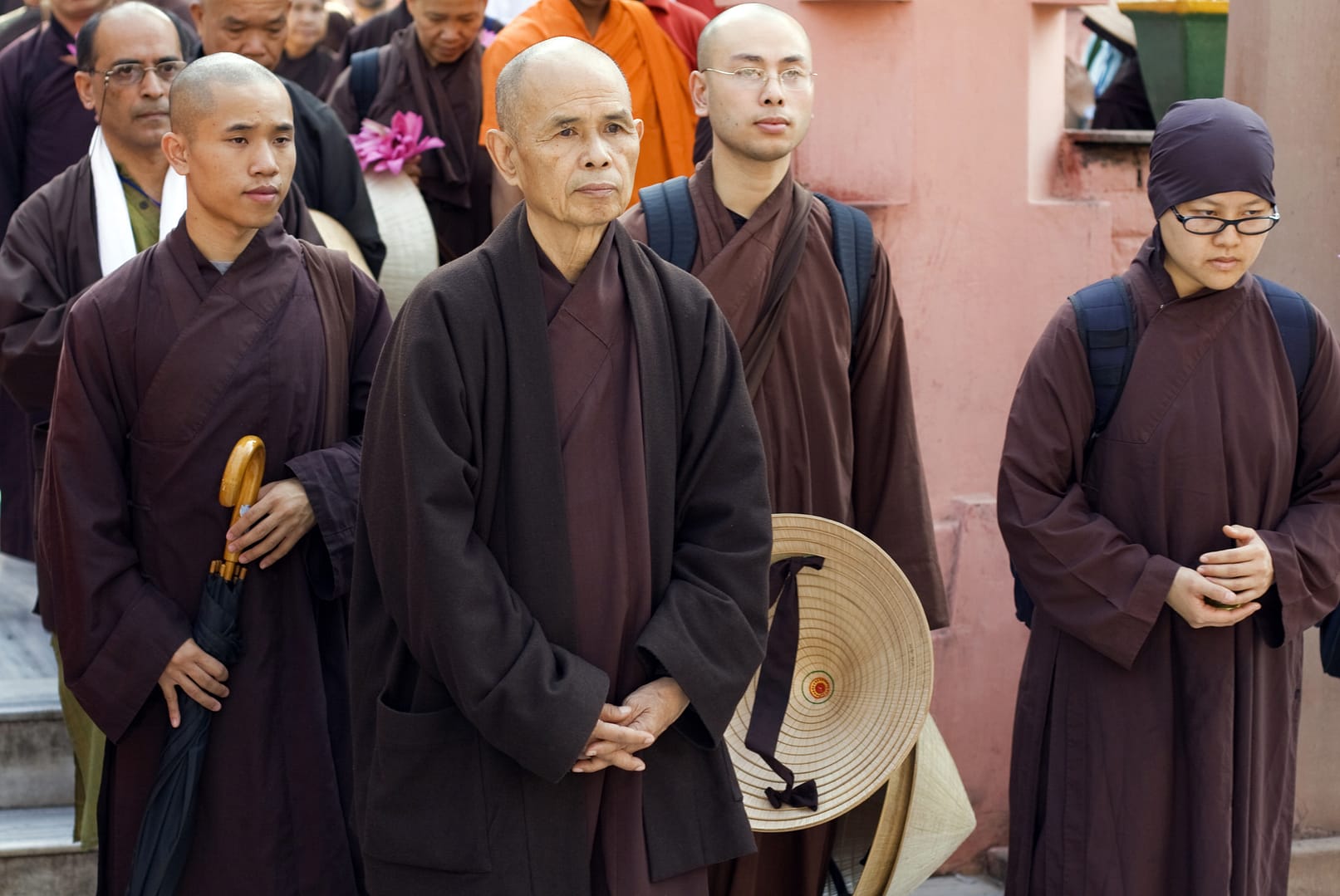Earlier this year (2022), the world lost a great spiritual leader as the Vietnamese Buddhist monk Thich Nhat Hanh died at age 95. Nhat Hanh's home or root temple was Tu Hieu Temple near the city of Hue in central Vietnam. He was from the Thien school of Buddhism, which most westerners are more familiar with its Japanese name of Zen. Nhat Hanh was a peace activist, teacher, prolific writer, inter-faith dialogue participant, translator, and purveyor of Buddhism to the West.
Thich Nhat Hanh was a significant activist for nonviolence and peace. With his commitment to peace and nonviolence, Nhat Hanh writes:
We often think of peace as the absence of war, that if the powerful countries would reduce their weapons arsenals, we could have peace. But if we look deeply in the weapons, we see our own minds—our prejudices, fears, and ignorance. Even if we transport all the bombs to the moon, the roots of war and the roots of the bombs are still here, in our hearts and minds, and sooner or later we will make new bombs. To work for peace is to uproot war from ourselves and from the hearts of men and women (Living Buddha, Living Christ, pp. 76-77).
Nhat Hanh was instrumental in getting Martin Luther King, Jr to speak out against the Vietnam War. In return, in 1967, Nhat Hahn was nominated for the Nobel Peace Prize by King
Thich Nhat Hanh coined the term "engaged Buddhism," which sought to apply Buddhist ethics to the broader contemporary world. This was a logical step as one of the two central norms of Buddhism is compassion. So, instead of monks and nuns retreating to monasteries or laypersons simply internalizing their religion, engaged Buddhism argued that Buddhists need to be active in the world to relieve suffering and establish justice. Nhat Hanh continually reminded Buddhist practitioners of this:
If while we practice, we are not aware that the world is suffering, that children are dying of hunger, that social injustice is going on everywhere, we are not practicing mindfulness. We are just trying to escape (Living Buddha, Living Christ, p.83).
Consequently, Nhat Hahn was active in the peace and deep ecology movements over his lifetime. He was also a vegan, and considered abstaining from animal-based food and products as a nonviolent practice toward animals.
Nhat Hanh's peace activism cost him in personal terms. His opposition to the Vietnam War, especially America's involvement, put him at odds with South Vietnam's leadership. In 1966, the South Vietnamese government took advantage of his travels abroad and banned him from returning home.
After the collapse of South Vietnam and the unification of Vietnam under communist rule, Nhat Hahn fared no better because of the ruling government's atheism. No more interested in letting a world-famous Buddhist monk return to their country, Vietnam continued his exile.

Foremost, Thich Nhat Hanh was a teacher. He was known affectionately as 'Thay,' which means teacher. He traveled the globe giving speeches and teaching at retreats. If you are even aware of the word "mindfulness," then Nhat Hanh has impacted you, even if you have never heard of his name.
No one is more responsible for developing and spreading the concept of mindfulness and its practice than him. Consequently, Thich Nhat Hanh is often referred to as the "father of mindfulness."
While Nhat Hanh comes from the Zen school of Buddhism, he drew from various forms of Buddhism and even Western psychology to develop the modern form of meditation practice that has come to be known as mindfulness.
In 1982, still prevented from working in his home country, and by then, a world figure, Nhat Hanh helped establish the Plum Village Monastery near Bordeaux in southern France. It became the largest Buddhist monastery in the West, with more than 200 monastics in residence and attracting over 10,000 visitors a year. Nhat Hanh was a major influence on the Western practices of Buddhism.

Plum Village Monastery, Bordeaux, France
He was very successful in making Buddhist thought accessible to people worldwide. He built bridges between psychological sciences, modern healthcare and ancient Buddhist practices.
While Thich Nhat Hanh's work did much to spread Buddhism in the West, he was less interested in converting people and most interested in finding common truths among the world’s religions. He translated Buddhist ideas into concepts of universal spirituality and found similar ideas in other religions. Nhat Hanh wrote:
When young people come to Plum Village, I always encourage them to practice in a way that will help them to go back to their own tradition and get rerooted. If they succeed at becoming reintegrated, they will be an important instrument in transforming and renewing their tradition. After an interfaith retreat in Santa Barbara, one young man told me, "Thay, I feel more Jewish than ever. I will tell my rabbi that a Buddhist monk inspired me to go back to him." People from other traditions said the same thing (Living Buddha, Living Christ, p. 89).
Not surprisingly, Nhat Hanh was known for his involvement in interfaith dialogue. He became friends with Martin Luther King Jr, Thomas Merton, and Daniel Berrigan. He also dialogued with Pope Paul VI on peace issues.
In 2005 the Vietnamese communist government finally allowed Nhat Hanh to visit his home country. During his visit, he was allowed to travel, teach and publish. He was also allowed to visit his root temple Tu Hieu Temple in Hue.
In 2018, Nhat Hanh received permission to return to Vietnam permanently. There he returned to the Tu Hieu Temple, where he died on January 22, 2022, at the age of 95.
Thich Nhat Hanh and I share an alma mater. He earned the joint Master of Arts in Religion from Union Theological Seminary and Columbia University in 1963, and I received the Master of Divinity degree from Union in 1990.
Nhat Hanh was a prolific writer who published over 130 books, including more than 100 in English. He is one of my favorite spiritual writers, and his thought has influenced me profoundly. I would especially recommend Peace is Every Step: The Path of Mindfulness in Everyday Life, Living Buddha, Living Christ, and Going Home: Jesus and Buddha as Brothers.
In "Like a Leaf: We Have Many Stems," contained in Peace is Every Step, Nhat Hahn tells about an experience he had one day while in a park. The passage seems especially appropriate upon his passing.
One autumn day, I was in a park, absorbed in the contemplation of a very small, beautiful leaf, shaped like a heart. . . .
. . . I asked the leaf whether it was frightened because it was autumn and the other leaves were falling. The leaf told me, "No. During the whole of spring and summer I was completely alive. I worked hard to help nourish the tree, and now much of me is in the tree. I am not limited by this form. I am also the whole tree, and when I go back to the soil, I will continue to nourish the tree. So I don't worry at all. As I leave this branch and float to the ground, I will wave to the tree and tell her, 'I will see you again very soon.'"
That day there was a wind blowing and, after a while, I saw the leaf leave the branch and float down to the soil, dancing joyfully, because as it floated it saw itself already there in the tree. It was so happy. I bowed my head, knowing that I have a lot to learn from that leaf (pp. 116-117).
Thich Nhat Hanh has and will continue to nourish millions upon this earth.






